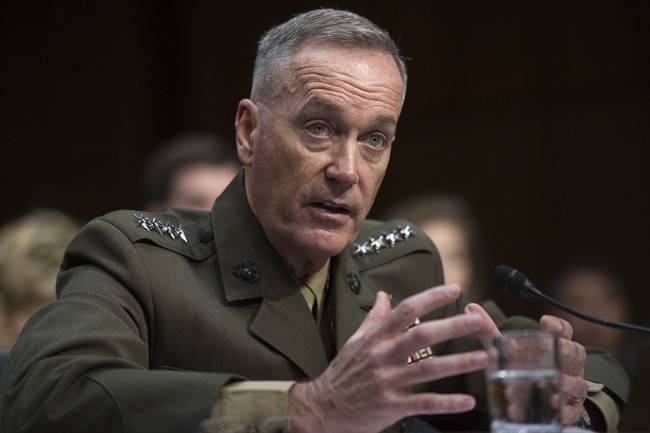BAGHDAD (AP) — The new top U.S. military officer said Tuesday he sees no prospect right now for Russia to expand its airstrike campaign into Iraq, speaking after briefings to update him on the battle against Islamic State militants.
Marine Gen. Joseph Dunford, chairman of the Joint Chiefs of Staff, made his first trip to the war zone since taking the top post on Oct. 1. He told reporters traveling with him that U.S. officials spoke with Iraqi leaders and were told no Russian airstrikes had been requested, despite earlier reports that Prime Minister Haider al-Abadi wanted Russia’s help against Islamic State militants.
Dunford planned to talk with his commanders to get updates on battles in Beiji and Ramadi, where Iraqi forces have made some recent gains.
“Being in the job about two weeks, one of the things I want to do is go over here, get eyes on, on the ground,” Dunford said as his C-17 headed into Irbil.
Dunford’s flight into Iraq was suddenly delayed when Iraqis on the ground in Baghdad refused to allow his C-17 aircraft to land in Irbil.
Just before 9:30 a.m., local time, as Dunford’s plane was nearing Baghdad en route to Irbil, the crew was directed to fly instead to Baghdad.
The change set off a flurry of activity on the plane, as military staff quickly yanked phones and cords out of containers to make urgent phone calls to officials on the ground, to fix the confusion. After about a half-hour, the aircraft got permission to land in Irbil.
It was unclear what triggered the mix-up, but officials said the plane’s flight had been pre-approved by Iraqi leaders.
This also is Dunford’s first overseas trip since he took the chairman’s job, signaling the high priority he and the Pentagon leadership place on finding the right formula to use local forces backed by coalition airstrikes to retake territory the Islamic State militants control in Iraq and Syria.
He met in Irbil with the head of Iraq’s Kurdish regional government, President Massoud Barzani.
“I am new in my job and one of the first things I wanted to do was come over here and see you,” Dunford told Barzani. “As you know, we have a common enemy,” the U.S. general said.
He then flew to Baghdad, where he met with Iraqi Defense Minister Khaled al-Obeidi, and is scheduled to meet with al-Abadi. He met with senior U.S. military leaders.
Dunford’s stop in Iraq comes after three days of meetings with senior military and government leaders in Israel and Jordan, two key U.S. allies in the region. In both countries, Dunford heard officials’ concerns about the Islamic State threat and the roiling instability in the region.
Late last week Iraqi troops backed by Shiite militia fighters drove IS militants out of the Beiji oil refinery, which has been contested for months.
Iraq announced Tuesday that it had driven Islamic State militants out of Beiji, which is about 155 miles (250 kilometers) north of Baghdad and is strategically located on the road to Mosul, the country’s second-largest city.
According to U.S. Lt. Col. Mike Filanowski, an intelligence officer with the military’s joint task force in Baghdad, Iraqi forces – largely the special operations troops – secured the refinery’s perimeter and the power plant to the north, and were slowly moving toward the center of the refinery, clearing enemy fighters.
He said they are encountering explosive devices and sniper fire. Filanowski estimated that there were still about 200 Islamic State fighters around the refinery, with more east of the river.
Mosul and Ramadi, the capitol of Iraq’s western province of Anbar, are both under IS control, and efforts to retake them have been problem-plagued.
Earlier this month, however, U.S. officials said Iraqi ground forces have advanced to the outer suburbs of Ramadi and that conditions may be right to launch an assault to take back the city.
Dunford’s visit comes just a few months after Defense Secretary Ash Carter made a trip to Irbil, also meeting with Kurdish leaders. And at the time, Carter told U.S. and coalition forces that the Kurdish troops, known as the Peshmerga, are “the model of what we are trying to achieve” – capable and motivated local forces who can battle Islamic State militants.
The U.S. has been training and equipping the Kurdish forces, through the auspices of the Iraqi government. And the Kurds have proven to be better able to combat IS than the Iraqi Army.
So far, the U.S. has not provided arms directly to the Kurds, insisting instead that it work through the country’s central government in Baghdad in order to avoid fomenting more division.
Islamic State extremists swept across northern Iraq last year, taking over large sections of the country. Much of the Iraqi Army collapsed, with troops fleeing or joining the militants.
© 2015 The Associated Press. All rights reserved. This material may not be published, broadcast, rewritten or redistributed. Learn more about our Privacy Policy and Terms of Use.




